- Home
- Sarah Hall
Sudden Traveler
Sudden Traveler Read online
Dedication
H’e
Epigraph
But somehow, somewhere, sometime soon
Upon this wild abandoned star
Contents
Cover
Title Page
Dedication
Epigraph
M
The Woman the Book Read
The Grotesques
Who Pays?
Orton
Sudden Traveler
Live That You May Live
Acknowledgments and Thanks
About the Author
By the Same Author
Copyright
About the Publisher
M
A warm, damp, starless night in the city. The last night of summer. Darkness moves like an ocean above the roofs and streetlights. The wind is directionless, confusing the trees, loosening sidings and tiles. Creatures of flight have put themselves away, under the eaves, down chimneys; raptors are tucked behind beveled glass spires. The windows of houses stand open, venting air, exhaust, and the fume of falling leaves. The lungs of sleepers are evolving. It is the hour between prayers.
She wakes. As she turns in bed, away from the body on the other side, she notices a pain. It’s low down, on the right-hand side, a soreness like appendicitis. But she has no appendix, only a surgical cleft in the skin, left over from childhood. The organ was removed after rupture and septicemia; her body flooded with poison, the school nurse having told her twice to go back to class, the ambulance moving sluggishly down the valley’s roads. Lucky to be alive, the surgeon said, once her blood had clarified. Her father bought a new car while she was recovering, the first soft-top in the village, and he drove it into the hospital grounds, sounding the horn outside her window. Who can that be, her mother asked. She was driven home triumphantly, lilting to the side, exhilarated, the wind racing through her hair.
So began a life’s contract of survival and compensation. The metal breath of the tractor as it rolled, inches from her, down the steep upper field, its brake having failed, crushing her father under its huge rear wheel. The estate’s payout for the loss of its manager, enough to fund law school and a basement flat in London. The motorcycle accident when she was nineteen, riding pillion with a boyfriend who’d told her that he loved her, who visited the spinal unit once, saw the halo screwed to her scalp to immobilize her neck, and didn’t come again. Six months later she saw him in a bar, or rather he saw her, un-killed, risen, beautiful, faint red holes along her brow. The ankle broken from falling in Appalachia: airlifted down off the trail after three days, unconscious, dehydrated, bone exposed through the skin, clean as an arrowhead, the rescue message with her GPS coordinates delayed by weather. Every glass of water after, a minor ecstasy. Events to chart pain’s signature. Reaction to malaria prophylactic, transit of a kidney stone, wisdom tooth extraction. The night she was forced, while her mother was away in the hospital. The morning she was forced again. She has always left room for worse, the unimaginable, and what may follow.
Comparatively, this is not severe. But it is unlike anything before. She sits up, holds her stomach. What? Not cramps; her periods are insignificant, her body having shed its viable eggs the decade before. Not a virus, though it’s the weakest hour of immunity, the time sickness usually comes. She lies back down, tries not to wake Ilias, and waits for it to pass. It is the most peculiar sensation. A hot zipping feeling under the skin, moving from hip to belly. No, unzipping.
Her lover stirs, but continues to sleep. Tick, tick, tick, across the abdomen, as if sutures are being unstrung. She tenses, resists, but then allows it, expects it, as one might surrender to contractions. Heat radiates up her torso, and beads of sweat begin to trickle underneath her breasts. The sheets dampen. After an hour, the discomfort fades. She gets up, opens the window wider, drifts back to sleep inside a turbine of cool air.
In the morning, nothing remains, though she feels a little clumsy, knocks her water glass on the bedside table and soaks a book. She gets up to shut the window, collects the yellow leaves blown in. Ilias is awake, propped on an arm, watching. Her legs are stiff, uncooperative as she bends. She does not feel usual. Nevertheless, they make love, on their sides, facing each other, an angle of great pleasure and intimacy. Memories of the night interfere. She struggles. After a few minutes he realizes, moves on top, comes on her belly, and apologizes. Say you’re not sorry, she says, and smiles. I’m not sorry. But your sheets? No, it was me, she says. I think I overheated. He kisses her. Re-enters. Wetter. These are acceptable risks; from the start, they have not been careful. The blood is loaded in the right place; her nerves are ready. This time, release. She cries into his shoulder, leaves a mark.
She lets him make the coffee in her kitchen, black, bitter. They dress, talk for a few minutes, but there is no time. She takes the stairs down with him. As he leaves, he turns and waves, looks up. He loves the building, its sculpted brutalist concrete, the distinctive middle tower. He is young, works for an architect, low in the chain, but is gifted, she suspects. The firm is responsible for the fast-altering skyline, the smoked-glass high-rises at the sea end of the river, which mirror the marsh they are deposing. Twice a week, more often lately, they meet in a bar for a drink, spend the night. It’s enough.
The street is littered with bright leaves, pulp, and small branches. There’s a cider aroma, and the smell of latrines, flushed gutters, sodden fur. She walks to her office, remembering other autumns, their lucidity, bronze northern light. When she arrives, her secretary looks agitated, hands her a message, a request that would not usually be filtered through, and a prepared file. I know this place, the secretary tells her, it’s called the Haven. My sister and I lived there for six months. Please look. She takes the held-out file. Thank you, Katya.
The next night, the pain returns, around the same time, folding her double. She is alone, and it is worse. The bands of muscles seem to be spasming, pulling her midriff tight, pulling it apart. She could almost put her fingers in. And a definite fever, fugue-like, tubercular, the sheet sticking to her back. Not nausea but a desire to retch, as if her tongue is curling down her throat. Is it the flu? Has she picked up an infection? What other organ has gone wrong? She shifts position, gradually, inch by inch, one side, then the other, but she cannot find relief. In the morning she will call the doctor. She tries to think. Of the date of her last period, date of her last screenings, the year her mother died. Of relevant stories, misaligned pregnancies, tumours, anomalies. She tries to think.
When dawn arrives the riven feeling is again passing, and the delirium. She falls asleep, misses the alarm. She is woken by the annunciation of bright mid-morning. It is a busy day, a partners’ meeting, lunch with an old friend who has moved back after divorce. In the afternoon she visits the Haven, which has been bought—it is unclear by whom—and is under threat of closure. At the shelter are women who have been abused, tormented, even shot. The children play families with each other, swap stories like war trophies, are careful with their names. A girl with pale-green eyes, a teenager, holds a toy dog to her chest, an item much too young for her. Black and white, like a Border sheepdog. She will not put it down. The staff are tired, and overworked, and also scarred. She accepts the case, her first pro bono work in years. Back at the office her secretary hugs her, awkwardly, and thanks her. The day ends. The absence of pain is a place of forgetting, a country far away. She does not call the doctor.
That evening, she meets Ilias again. A new bar, above a sex shop. The walls are somber navy, the woodwork charcoal, fashionably, darkly Victorian. Ineffectual candles pulse in the gloom. The drinks are exquisite, herbal spirits, very strong, mixed by muscled barwomen in leather aprons. They flirt, enjoy each other, as they always do. But a certainty is formi
ng in her mind. It will—it must—stop soon. He holds her hand across the table, uninhibited. For the first time in a long while she feels emotion heeling in her. He has such kindness, openness. He seems full of blue light, in the blue room. The men around him in the dim corners flicker, faces razored like ringmasters, eyes full of coils. She can almost taste their lust, like brine thumbed into her mouth. New drinks arrive, blazingly green. Absinthe. She sips from her glass, licks the salt on its rim.
She feels Ilias watching her. He must sense something; assume, perhaps, a hesitancy of defenses. He starts to talk more freely. He’s going to write a book. The dream psychology of buildings. Or, the psychology of dreamed buildings. The theory: where you are, inside, outside, where the windows are, it’s all significant to the mind. Can a building be entered, is it sealed, grown over, derelict, are the stairs functional or partial, are there clandestine chambers, tunnels, gardens, where are your family members? Everything is meaningful. He makes a good case. But she remains quiet, has entered a separate mood. Do you dream of buildings? Possibly, she says. Unremembered Dreams is a book I should write. He nods, confused. This is the truth, though; she has never remembered a single dream. The other night, he says, you were quite restless. I thought perhaps you were dreaming then. She gestures for the bill. Sorry. Indigestion.
At her apartment they lie in each other’s arms. The room revolves slowly. The numbing amnesty of alcohol, like a new grace. Ilias falls asleep, snores gently. On the pillowcase, his dark hair looks painted, somehow iconic. He shaves once a month, allows his beard a full growth, then back to scratch. She’s seen it three times, this journey from boyhood to manhood. His body scent is something from the earth, wholesome, safe. On his neck, fresh arboreal cologne that reminds her of a line she once read. I am a forest, and a night of dark trees: but he who is not afraid of my darkness, will find rosebowers too under my cypresses. It must end. But tonight, there is only the present, these harmless turning moments. Another. And another.
3 a.m. Night’s zone of monstrous emptiness, terrors, the intransitive. She moves to the edge of the bed, sits carefully, her feet on the floor, leaning forward. Outside, the wind is up again, less playful now, intuitive, urging. It’s like a voice, has the voice’s authority and instruction. The numbers on the clock change. She breathes out. In. Out. Like a knife, the pain splits her. She tries not to make a noise, but a muted blurt escapes her mouth. Ilias is face down, stupored; he doesn’t wake. She finds herself slipping to the floor, knees folding under, boneless material, a sack of herself. Her chin hits the carpet, there’s spittle all round her mouth. She cannot feel her legs. An extraordinary, medieval agony is halving her body, winding her intestines apart. A strong desire to void her bowels and stomach. The pain divides suddenly, forks up toward her shoulders. Pressure charges all along her back, like lightning crouching in the sky. It is unbearable.
She arches up, begins to move away from the bed, toward the window, fingers digging in the carpet. It feels like she is pulling free from a useless section of herself. She could call for help. But her lips are hard as a beak, her mouth full of gristle. She keeps pulling forward, ripping the carpet, strength she did not know she had, as if crawling from a fire, or a collapsing building. Above her, the whole room seems to be alive, made of soft moving skin. Her eyes begin to blur and spill. When she looks back, everything has warped, her legs are far away, severed, joined by a dark red stem of meat. She passes out.
In the doorway, she tells Ilias she cannot see him again. He’s a wonderful man who she is sure will do brilliant things—his expression clouds, and she regrets the patronization immediately. She tries again. There’s too much distance. She is sorry, but it’s over. Distance? She shrugs. Just differences between us. He is surprised, but maintains composure; there will be no name-calling, no terrible scene. Still, she feels foolish, fraudulent. It all sounds so pat, the language of a serial romantic performer. Look, I’m unreliable, she says. He laughs. That’s it? Don’t be ridiculous. Please. He puts a hand to her face. Tell me what I did wrong? The submission, the reproach, is excruciating. She feels herself begin to panic and reverse. He’s no criminal, and she is sick or possibly going mad. Something has ruptured in her brain and is trickling out. No, she thinks, no. I am this. There’s no choice.
After he has gone she takes a walk. Colder currents have arrived from the north. People are in big coats, scarves, boots. Pools of water glisten on the pavement. Scales of debris slide toward the drains. Under her own coat she feels dormant. She tries to concentrate on work, thinks about the shelter. It will be razed to make way for a development of unaffordable new flats. Vast money is behind the scheme, money from abroad, one of the city’s Middle Eastern kingpins, or Chinese, or American, no doubt. The city is being auctioned off and there is little she or anyone else can do. She walks without purpose, turns along the river. She watches people, absorbs them as they get close. Men: blunted by years of precedence, stinking of pheromones. The women. Their eyes give it away; their blood rises. They emit. Distress, fear, hope. Echoes of the past. Quiet, girl. Your mammy’s gone. I’ll fuck you till you come apart.
On the fourth night she makes it to the floor below the window, which has been the draw, and which has been left open, an exit, or an entrance. The pain is the same, and the passage along the floor the same, instinctive, effortful, but by fractions systematic. Beyond the hurt, there is a lifting feeling, a sense of the air’s shape and consistency. Something immense and powerful might be close, if she believed. The heap of flesh left behind disgusts her, its look, the sealed bowel, the plug of spinal bone, defecation of an old self. The hole, with all its laws and allure, simply a fistula in meat. Again, she loses consciousness, and wakes rejoined, in the former position, tucked over on the floor.
The days become reduced, emptying of meaning. She works. Her name, the firm’s name, are helping the case. There might be compensation, but there will be no stay of execution. Worse is the publicity that the staff thought, desperately, would help. The building, a small Edwardian sanatorium between corporate megaliths, has been revealed. Several men have tried to breach the entrance, piggy-backing after entering staff and sending the residents scattering to their rooms. One husband saw the door’s code being keyed. Only because a particular guard was on duty was he was stopped. Cantrell—the calm, steroidal massif, ex-boxer, ex-bouncer, who suffered knife injuries on his arm while holding his attacker’s ten-week baby behind his back. After a week’s surveillance the police have stepped down their presence. When she visits, the place feels primed for disaster, like a stick house on the prairie, a motherless antelope. She works on the case, but she is simply biding.
Nights are the source of the real dynamic. Each one a lesson in emergence, each one bringing her further. Violent alteration, acceptance, discarding. Crawling. Reaching the window. Pulling herself up on to the sill. The air beaten frantically behind her. Until, one night, she is there, holding the frame, her raw torso hovering an inch above it, balanced, the canopy still shipped inside her back, ballistic, keen. This, the sixth floor of the brutalist tower. The gardens below are paved, unsurvivable. Air’s theories sweeping stupidly past: vortices, thermals. Her eyes are closed. She cannot be her own witness.
And then, the survival mechanism is overridden. A half push, half forward cast. The last decision of life, and the momentary drop, a first rush, like the waterfall’s crest, the brink of climax. For that second, such kinetic beauty, trust in nothingness. Then—a crack behind her, huge and dull and viscous, as the wings extend, unfurl and are filled, begin her flight. Suddenly, the city is far below, turning slowly in relief, roadways, estates and parks, contoured and furrowed and rapidly passing, a new landscape, a map of the hunt.
Only their cries follow her home. Not the bleats of discomfort during, often they are asleep, do not know exactly what is happening, but after, when they wake and are left with the knowledge of reprieve, when they see small patches of blood on the sheet. Their bodies can be entered through th
e mouth, belly, the hole through which all was created—the product taken out by the tongue’s long catheter. It is no more nutrient than grass used as emetic. It does not take long, if they are sleeping on their backs. A minute. Something about her presence paralyzes, as an eclipse dulls the hidden world. Rarely do they rouse. At the first sting, their eyes might flutter open in the dark, the whites glowing like phosphorescent eggs. She puts pressure on the mouth, gently returns them to unconsciousness.
Their confliction after—for it is possible to love the issue of a crime, even as the cure delivers—is theirs alone. She leaves the window as she found it, unlocked, cracked, redeploys herself into the night. Their bodies are reset, if not restored. There is never freedom from it. Or brief freedom might be invalidated, if they do not leave him, if they replace him with another of that kind, if they are, again, unlucky victims. But she never visits the same woman twice. What she is, field surgeon, avorteuse, predator, comes with its own invulnerable mechanic, exemption. She is, must be, human-proof.
Such a raucous call. There are so many—she could not have known before. And she cannot find them all. She seeks first the ones who transmit loudest, smell strongest, those who cannot hide and for whom it will be worst. Girls. The girl given animal tranquillisers, shared by seven of them, a lottery of seed inside. The girl found on the estuary bank, inside a suitcase, not able to speak English, who left the hospital before the interpreter arrived, ghosting every camera. The girl who was filmed, and filmed after giving her consent. The girl whose uncle. The girl whose mother’s lover. The girl whose cousin. The girl who jumped from the bridge and was caught by an angel with wings so vast they looked like moons, who was made love to in the sky, and set down by the lion on the bridge, and that lion was no more a lion than a lapdog then. The disabled. The mentally unwell. She is more ruthless with those, no anesthesia, because if they see her it will not be believed, she will only have slipped from the wards of their minds. Nights of hunting and listening. Finding, entering. And at the end, in the flare of dawn before she gets back to the tower, the whole embryonic mass is ejected from her mouth, like a senators’ feast. Always in the same place, territorially—a small, unmanned substation with high walls, near the railway line, where the trains pulse and screech and carry negligible cargo.

 Sudden Traveler
Sudden Traveler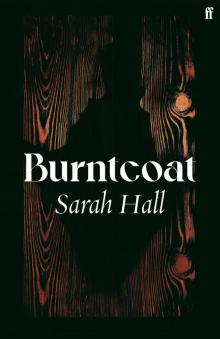 Burntcoat
Burntcoat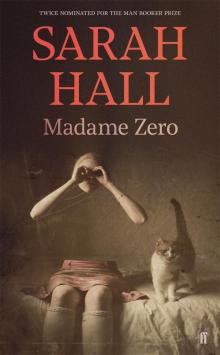 Madame Zero
Madame Zero Mrs Fox
Mrs Fox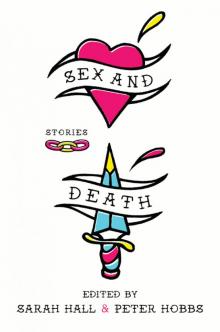 Sex and Death
Sex and Death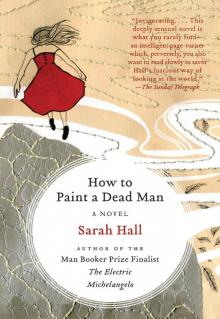 How to Paint a Dead Man
How to Paint a Dead Man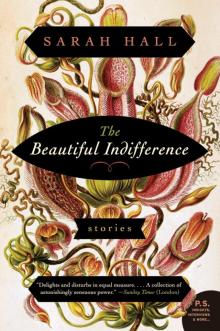 The Beautiful Indifference
The Beautiful Indifference The Wolf Border
The Wolf Border The Electric Michelangelo
The Electric Michelangelo